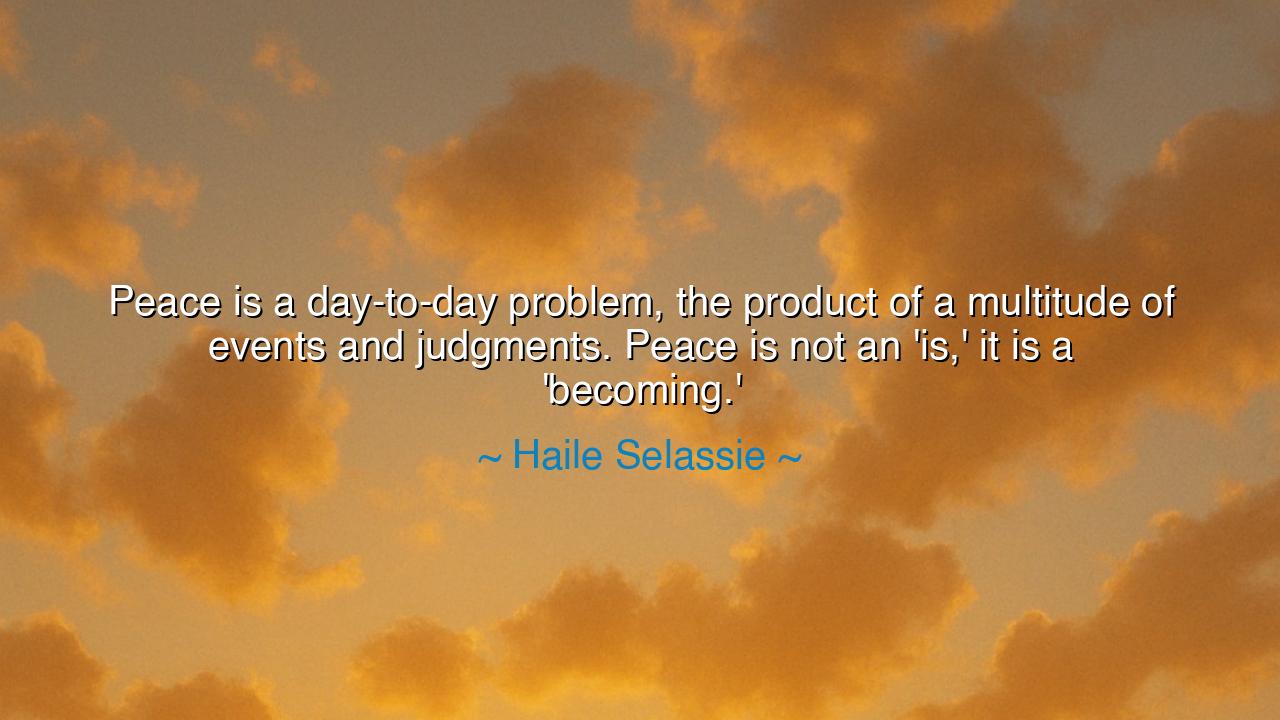
Peace is a day-to-day problem, the product of a multitude of
Peace is a day-to-day problem, the product of a multitude of events and judgments. Peace is not an 'is,' it is a 'becoming.'






Haile Selassie, the Lion of Judah and Emperor of Ethiopia, once declared with solemn wisdom: “Peace is a day-to-day problem, the product of a multitude of events and judgments. Peace is not an ‘is,’ it is a ‘becoming.’” In these words lies not the dream of an idle philosopher, but the lived truth of a ruler who bore the weight of a nation through war, exile, and betrayal. His proclamation is a torch to the generations: peace is not a fixed jewel that can be placed on a crown and forgotten. It is a living flame, fed daily by choices, sacrifices, and acts of courage.
The origin of these words rests in Selassie’s own trials. He witnessed his beloved Ethiopia invaded by Mussolini’s armies, heard the cries of his people under tyranny, and stood before the League of Nations in 1936 to warn the world that the aggression permitted against his nation would, like a contagion, spread to all mankind. For him, peace was not abstract—it was survival, justice, and the hope of restoration. He knew too well that one proclamation of peace means little if it is not sustained by vigilance, by fairness, by countless decisions made in the marketplace, the courtroom, and the throne room alike.
By calling peace a “becoming,” Selassie revealed the eternal truth that peace is not a static state but a journey. It is forged anew each day, in the judgments of leaders, in the choices of ordinary people, in the compromises that heal division, and in the courage to forgive rather than strike back. Just as a field must be tilled and watered daily if it is to yield harvest, so must peace be cultivated through constant effort. Those who imagine peace to be permanent without labor deceive themselves, for neglect allows weeds of hatred and pride to grow swiftly.
History gives us confirmation. Consider the fragile peace after the First World War. Leaders proclaimed the “war to end all wars,” but neglected the daily work of fairness and reconciliation. The Treaty of Versailles sowed resentment, inequality, and bitterness. The peace declared in 1919 was treated as an “is,” rather than a “becoming.” And so, within a generation, the world was aflame again. Contrast this with the peace built after the Second World War, when the Marshall Plan, diplomacy, and the creation of institutions sought not only to end war but to build structures of trust and cooperation. It was imperfect, yet it endured because it was cultivated daily.
Selassie’s words also echo into the heart of the individual. For just as nations must labor for peace, so must every soul. Peace within the self is not a treasure found once and kept forever. It is the fruit of daily discipline—of patience, forgiveness, and wisdom in judgment. Anger, fear, and pride are like enemies at the gate, ever ready to storm the soul. Only by constant watchfulness can the inner kingdom remain in harmony. Thus, the Emperor’s wisdom is both a call to rulers of nations and to the rulers of their own hearts.
The lesson is clear: do not treat peace as a possession, but as a task. It is not something bestowed once for all time, but something we must choose and shape again and again. In our families, peace is maintained through daily acts of kindness and restraint. In our communities, through justice and respect. In our nations, through diplomacy, fairness, and vigilance against tyranny. Peace must be built as a wall is built—stone upon stone, day after day.
Practically, this means that each of us must become artisans of peace. Resolve conflicts quickly, before bitterness grows. Choose words that heal rather than wound. Seek fairness in judgment, even when it costs you. Support leaders and policies that labor for justice rather than conquest. And above all, do not grow weary of the work, for peace is not a destination reached once, but a road walked endlessly.
Thus, Haile Selassie’s words stand as both warning and hope: “Peace is a day-to-day problem, the product of a multitude of events and judgments. Peace is not an ‘is,’ it is a ‘becoming.’” Let them remind us that the work of peace belongs to all—leaders, citizens, and children yet unborn. For if we fail to tend it, peace will wither. But if we nurture it daily, it will grow strong, a living tree whose shade will shelter generations to come.






AAdministratorAdministrator
Welcome, honored guests. Please leave a comment, we will respond soon